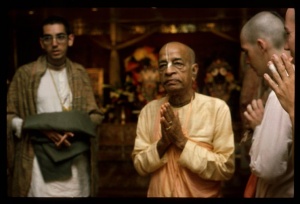CC Antya 16.148 (1975): Difference between revisions
(Vanibot #0027: CCMirror - Mirror CC's 1996 edition to form a basis for 1975) |
(Vanibot #0020: VersionCompareLinker - added a link to the Version Compare feature) |
||
| Line 2: | Line 2: | ||
<div style="float:left">'''[[Sri Caitanya-caritamrta (1975)|Śrī Caitanya-caritāmṛta (1975)]] - [[CC Antya (1975)|Antya-līlā]] - [[CC Antya 16 (1975)|Chapter 16: Lord Śrī Caitanya Mahāprabhu Tastes Nectar from the Lips of Lord Śrī Kṛṣṇa]]'''</div> | <div style="float:left">'''[[Sri Caitanya-caritamrta (1975)|Śrī Caitanya-caritāmṛta (1975)]] - [[CC Antya (1975)|Antya-līlā]] - [[CC Antya 16 (1975)|Chapter 16: Lord Śrī Caitanya Mahāprabhu Tastes Nectar from the Lips of Lord Śrī Kṛṣṇa]]'''</div> | ||
<div style="float:right">[[File:Go-previous.png|link=CC Antya 16.147 (1975)|Antya-līlā 16.147]] '''[[CC Antya 16.147 (1975)|Antya-līlā 16.147]] - [[CC Antya 16.149 (1975)|Antya-līlā 16.149]]''' [[File:Go-next.png|link=CC Antya 16.149 (1975)|Antya-līlā 16.149]]</div> | <div style="float:right">[[File:Go-previous.png|link=CC Antya 16.147 (1975)|Antya-līlā 16.147]] '''[[CC Antya 16.147 (1975)|Antya-līlā 16.147]] - [[CC Antya 16.149 (1975)|Antya-līlā 16.149]]''' [[File:Go-next.png|link=CC Antya 16.149 (1975)|Antya-līlā 16.149]]</div> | ||
{{CompareVersions|CC|Antya 16.148|CC 1975|CC 1996}} | |||
{{RandomImage}} | {{RandomImage}} | ||
==== TEXT 148 ==== | ==== TEXT 148 ==== | ||
<div class="verse"> | <div class="verse"> | ||
:nijāṅkure pulakita, | :nijāṅkure pulakita, puṣpe hāsya vikasita, | ||
:madhu-miṣe vahe aśru-dhāra | :madhu-miṣe vahe aśru-dhāra | ||
:veṇure | :veṇure māni' nija-jāti, āryera yena putra-nāti, | ||
: | :'vaiṣṇava' haile ānanda-vikāra | ||
</div> | </div> | ||
| Line 20: | Line 19: | ||
<div class="synonyms"> | <div class="synonyms"> | ||
nija-aṅkure—by their buds; pulakita—jubilant; puṣpe—by flowers; hāsya—smiling; vikasita—exhibited; madhu-miṣe—by the oozing of honey; vahe—flows; aśru-dhāra—showers of tears; veṇure—the flute; | nija-aṅkure—by their buds; pulakita—jubilant; puṣpe—by flowers; hāsya—smiling; vikasita—exhibited; madhu-miṣe—by the oozing of honey; vahe—flows; aśru-dhāra—showers of tears; veṇure—the flute; māni'-accepting; nija-jāti—as belonging to the same family; āryera—of forefathers; yena—as if; putra-nāti—son or grandson; vaiṣṇava—a Vaiṣṇava; haile—when becomes; ānanda-vikāra—transformation of transcendental bliss. | ||
</div> | </div> | ||
| Line 27: | Line 26: | ||
<div class="translation"> | <div class="translation"> | ||
"The trees on the bank of the Yamunā and Ganges are always jubilant. They appear to be smiling with their flowers and shedding tears in the form of flowing honey. Just as the forefathers of a Vaiṣṇava son or grandson feel transcendental bliss, the trees feel blissful because the flute is a member of their family.' | |||
</div> | </div> | ||
Latest revision as of 22:55, 26 January 2020

A.C. Bhaktivedanta Swami Prabhupada
TEXT 148
- nijāṅkure pulakita, puṣpe hāsya vikasita,
- madhu-miṣe vahe aśru-dhāra
- veṇure māni' nija-jāti, āryera yena putra-nāti,
- 'vaiṣṇava' haile ānanda-vikāra
SYNONYMS
nija-aṅkure—by their buds; pulakita—jubilant; puṣpe—by flowers; hāsya—smiling; vikasita—exhibited; madhu-miṣe—by the oozing of honey; vahe—flows; aśru-dhāra—showers of tears; veṇure—the flute; māni'-accepting; nija-jāti—as belonging to the same family; āryera—of forefathers; yena—as if; putra-nāti—son or grandson; vaiṣṇava—a Vaiṣṇava; haile—when becomes; ānanda-vikāra—transformation of transcendental bliss.
TRANSLATION
"The trees on the bank of the Yamunā and Ganges are always jubilant. They appear to be smiling with their flowers and shedding tears in the form of flowing honey. Just as the forefathers of a Vaiṣṇava son or grandson feel transcendental bliss, the trees feel blissful because the flute is a member of their family.'